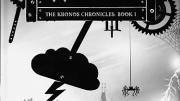While doing her doctoral research on childhood in Renaissance Europe, a period when 12- to 14-year-olds were considered adults, Marie Rutkoski, Ph.D. ’06, began to wonder what living in such a world would be like. Like many academics, she wrote a book to find out—except that hers was a fantasy novel written for young adults instead of a tome issued by a university press.
The Cabinet of Wonders (Farrar Straus Giroux), the first of Rutkoski’s projected four-book Kronos Chronicles series, entered bookstores in August, welcomed by critics and young readers alike. The novel tells the story of Petra, a 12-year-old who lives with her widowed father in Bohemia in the late 1590s. Their world is a fantastic one: Petra’s loquacious but tiny pet spider, Astrophil, is made of tin because her father has a magical ability to work with metal. He creates a clock that can control the weather for the young prince of Bohemia, but the prince, without explanation, has the clockmaker’s eyes removed by magic before the masterpiece is completed. The Cabinet of Wonders follows Petra as she sneaks away from home and into Prague, the capital city, in an attempt to get her father’s eyes back.
Rutkoski believes that children can handle a certain degree of darkness and therefore “never doubted or considered” her decision to have Petra’s father face blindness in the novel. “I think it’s important not to patronize child readers,” she says. Blindness is a subject that both “frightens and fascinates” Rutkoski herself: her own mother experienced cataracts that led to spells of temporary blindness while Rutkoski was growing up.
The Cabinet of Wonders was originally inspired by a trip Rutkoski took to Prague after college; she saw the city’s famous astrological clock and learned of the legend that the commissioner of the clock had the maker’s eyes gouged out. But Harvard has also influenced the Kronos Chronicles: Rutkoski’s second book, tentatively titled The Celestial Globe, was inspired by the Mercator globes on display in the Map Collection in Pusey Library. This book, set in London, also makes more use of Rutkoski’s academic experiences: she spent a year there on a fellowship and has incorporated her knowledge of the city’s sixteenth-century geography in her novel.
For all her success at creating a new world, novel-writing isn’t Rutkoski’s day job: she is a professor at Brooklyn College, where she teaches Renaissance drama, children’s literature, and creative writing. (Now on a one-year leave, she and her husband, an economics professor at NYU, were expecting their first child.) She says she finds academic work complementary to her writing: “Teaching during the day, writing at night—that seems to be the best of both worlds.”
Rutkoski is a fan of the Harry Potter series and particularly admires author J.K. Rowling’s attention to detail; with fantasy, she explains, readers “believe you based on how well you build your world.” To this end, in The Cabinet of Wonders, Petra’s tin spider can amplify his voice because metal naturally amplifies sound; also, like any animate creature, he needs food (in his case, oil).
But Rutkoski has more in mind for her young audience than the escapism inherent in a world with tin spiders: she hopes that her own scholarly interests—which appear in The Cabinet of Wonders in her descriptions of the Roma and of other aspects of Renaissance life—will intrigue readers even as they follow Petra in her quest to recover her father’s eyes. “The part I loved most in graduate school was to discover little details about children as I researched,” she says. “I hope that in creating a novel, I might inspire the same interest in a child.” In between the lines of her books and within the world she’s created, Rutkoski hopes her readers pick up some history as well.









